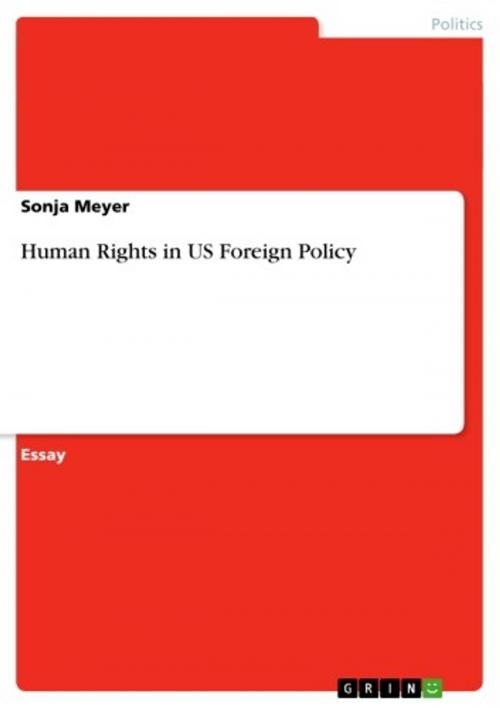| Author: | Sonja Meyer | ISBN: | 9783640186938 |
| Publisher: | GRIN Publishing | Publication: | October 14, 2008 |
| Imprint: | GRIN Publishing | Language: | English |
| Author: | Sonja Meyer |
| ISBN: | 9783640186938 |
| Publisher: | GRIN Publishing |
| Publication: | October 14, 2008 |
| Imprint: | GRIN Publishing |
| Language: | English |
Essay from the year 2007 in the subject Politics - International Politics - Region: USA, grade: A, University of Otago (New Zealand - University of Otago), 16 entries in the bibliography, language: English, abstract: The traumatic experience of World War II led to an international consensus on the need of a universal framework protecting the rights of each individual and the integrity of communities. The United States having been largely isolationist before the War entered the World stage and took a substantial part in the formulation of human rights. Against the background of the Cold War the institutionalization of a common framework was everything but easy. In retrospect it seems that the American commitment to human rights is ambivalent. On the one hand American rhetoric constantly uses human rights as a legitimating moral claim, on the other hand it stays in its exceptionalist tradition and sees itself not to be in need of any international supervision. To understand the gap between ideal and reality, the concept of American exceptionalism needs to be examined. How does this conception affect the political culture in the USA and how can we explain this sense of superiority? Another question will be the legitimacy of this belief and the rationale that drives policy makers to perpetuate this notion. To evaluate the commitment to human rights in foreign policy, it will be necessary to have a look at the different administrations and their attitude toward human rights. They all face institutional constraints in policy decision making so that even if there is a 'real' commitment to human rights, it is not enough that the president himself endorses such a framework. Similarly, there are other national interests that can trump moral considerations which was especially evident during the Cold War. Special events and public opinions as well as ideological beliefs of the main actors strongly influence the place of human rights in the hierarchy of preferences. Even though good intentions can be identified in some administrations, the commitment to human rights in US foreign policy remains rather marginal and serves merely as a legitimating rhetoric. This affect not only the credibility of the United States itself but the validity of the whole concept of universal human rights.
Essay from the year 2007 in the subject Politics - International Politics - Region: USA, grade: A, University of Otago (New Zealand - University of Otago), 16 entries in the bibliography, language: English, abstract: The traumatic experience of World War II led to an international consensus on the need of a universal framework protecting the rights of each individual and the integrity of communities. The United States having been largely isolationist before the War entered the World stage and took a substantial part in the formulation of human rights. Against the background of the Cold War the institutionalization of a common framework was everything but easy. In retrospect it seems that the American commitment to human rights is ambivalent. On the one hand American rhetoric constantly uses human rights as a legitimating moral claim, on the other hand it stays in its exceptionalist tradition and sees itself not to be in need of any international supervision. To understand the gap between ideal and reality, the concept of American exceptionalism needs to be examined. How does this conception affect the political culture in the USA and how can we explain this sense of superiority? Another question will be the legitimacy of this belief and the rationale that drives policy makers to perpetuate this notion. To evaluate the commitment to human rights in foreign policy, it will be necessary to have a look at the different administrations and their attitude toward human rights. They all face institutional constraints in policy decision making so that even if there is a 'real' commitment to human rights, it is not enough that the president himself endorses such a framework. Similarly, there are other national interests that can trump moral considerations which was especially evident during the Cold War. Special events and public opinions as well as ideological beliefs of the main actors strongly influence the place of human rights in the hierarchy of preferences. Even though good intentions can be identified in some administrations, the commitment to human rights in US foreign policy remains rather marginal and serves merely as a legitimating rhetoric. This affect not only the credibility of the United States itself but the validity of the whole concept of universal human rights.















